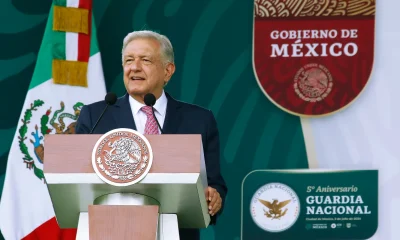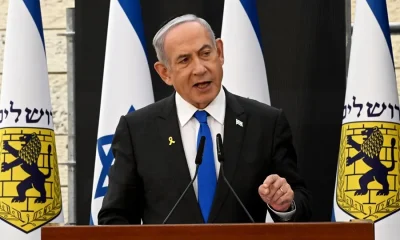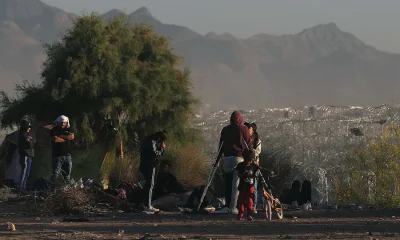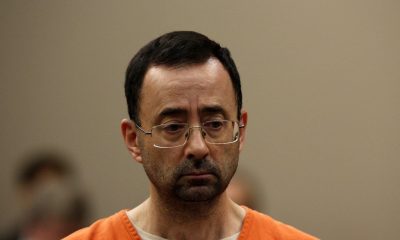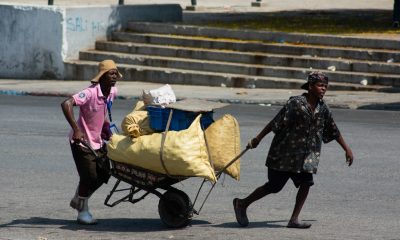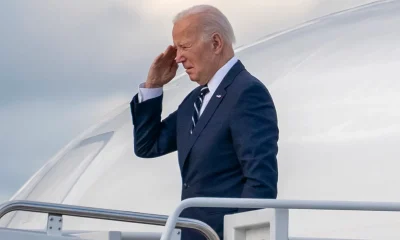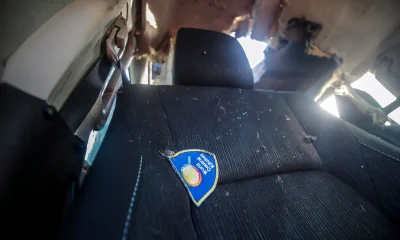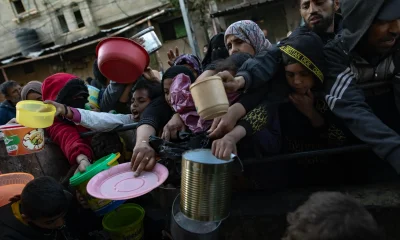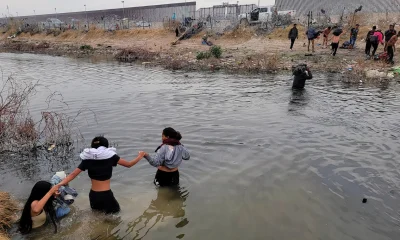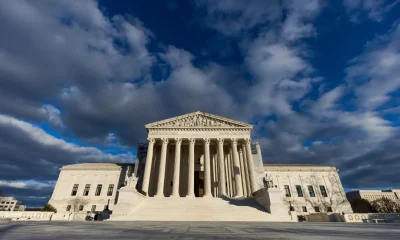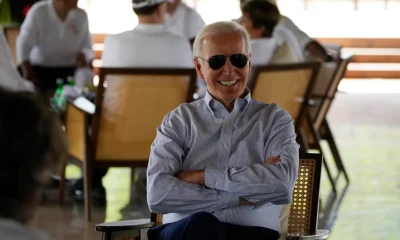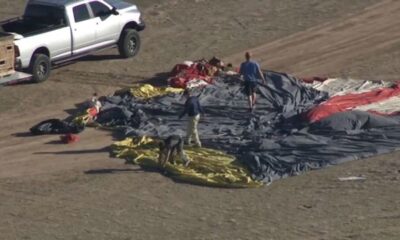International
The pro-Palestinian student movement in the United States looks at itself in history to continue
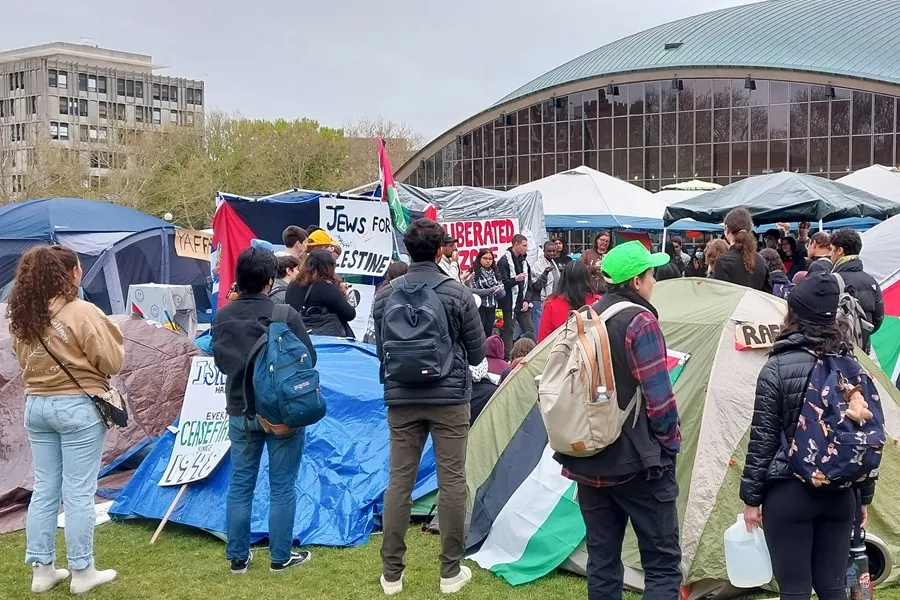
Opposition to the war in Gaza has triggered a student movement in the United States not seen since the protests against apartheid in South Africa in the 1980s and in rejection of the Vietnam War in the 60s, although the difference is the strong police reaction to more peaceful rallies.
The one that has already been called by historians such as Robert Cohen, of New York University, as the largest university movement in the United States in the 21st century has parallels with the uprisings of the past, but is also unique in forcing Washington to “be more careful with what it does with its military help.”
For Juan González, who was one of the leaders of the 1968 protests at Columbia University (New York), today’s demonstrations are much more peaceful but are facing more immediate repression.
“Never in the history of student protests has a protest been suppressed for so little violation of the law,” said Cohen, an expert in social movements, in a recent interview.
“Basically they are setting up camps in public spaces, they are not interfering with classes (…) we took several buildings in a single day,” he said in an interview with EFE González, 76, who considers that the police response is being much more severe on this occasion, with eviction of peaceful camps and more than 2,000 arrested.
Authorities from both New York City in the United States and the university were willing to negotiate with González and the other student leaders, he explained, something that has only happened in a handful of educational centers during the current movement.
In educational centers such as the University of California in Los Angeles (UCLA), the University of Texas in Austin or the University of South Florida in Tampa in the United States, state and local law enforcement agencies have entered to evict the camps and forcibly expel the students shortly after they congregated with the approval of the university authorities.
Another of the main differences is the historical context: the student protests of 1968 against the Vietnam War were included in a much larger movement that transcended the campuses and that included other causes such as the rejection of racial discrimination.
“Our strike in Columbia began only a couple of weeks after Martin Luther King was killed (…) there were riots and riots in more than 100 cities across the country,” explained González, who recalls that the worst moment of police repression was when in 1970 the Ohio National Guard killed four students at Kent State University.
The students’ requests, however, have similarities. Currently, university students ask educational centers to cut all kinds of ties with Israel and its military industry, while in 1968 they asked the institution to cut ties with the IDA, a center that was investigating weapons to be used in Vietnam.
The protests of now are also loaded with an “internationalist perspective” something that for the historian of the Massachusetts Institute of Technology (MIT) Tanalís Padilla did not happen years ago in the United States.
“Within the empire, the country’s actions are rarely taken aware of,” Padilla said of these protests against injustices that are happening “in another part of the world.”
The author of “After Zapata” indicated that this student movement has similarities with the fight against the Vietnam war in the 70s and the civil rights claims in the 60s, but contrary to the first case, “U.S. soldiers are not dying” and, in the second, there was no internationalist vision and solidarity with the suffering of the people of Palestine.
“It is a movement of international solidarity that has not been seen in a long time, which gives hope and it is very important that it happens in the most powerful country in the world,” said the teacher, a Jewish descendant of victims of the Holocaust and who has participated in the MIT student camp.
International
Claudia Sheinbaum: Operation Against ‘El Mencho’ Was Based on Pending Arrest Warrants

Mexico’s President Claudia Sheinbaum on Wednesday rejected claims that the military operation that resulted in the death of Nemesio Oseguera Cervantes, known as “El Mencho,” leader of the Jalisco New Generation Cartel (CJNG), was carried out under pressure from the United States government.
Sheinbaum explained that the deployment of federal forces was aimed at executing outstanding arrest warrants against Oseguera Cervantes, who was considered one of the most wanted criminals in both Mexico and the United States.
“That was not the objective (to ease pressure from the United States). It is very important, and I want to repeat it. This individual had an arrest warrant, or several,” Sheinbaum said, referring to the operation conducted on February 22.
According to the president, the initial goal was to capture Oseguera Cervantes, but military forces responded after coming under attack during the intervention.
“The operation was to detain him. The problem is that they were attacked — the Secretariat of National Defense — and they responded at that moment,” she said.
The president insisted that the action was not carried out in response to external demands, although she acknowledged intelligence cooperation with the United States.
“It was not done in any way because of pressure from the United States, not at all. Of course, there was intelligence information from the United States that was used specifically,” she concluded.
International
Spain Denies Any Agreement to Cooperate with U.S. Military in Iran Operations
International
White House Says Spain Agrees to Cooperate with U.S. Military After Trump Threatens Trade Embargo

White House Press Secretary Karoline Leavitt said Wednesday that Spain has agreed “in recent hours” to cooperate with the U.S. military, following President Donald Trump’s threat to impose a trade embargo on Madrid.
Trump had warned of potential commercial measures after Spain reportedly refused to allow the Pentagon to use facilities at Spanish military bases for operations related to Iran.
“With respect to Spain, I think you heard the president’s message yesterday loud and clear, and I understand that in recent hours they have agreed to cooperate with the United States military,” Leavitt said during a press briefing.
She added that the U.S. military is currently coordinating with its counterparts in Spain. However, the president expects broader support.
“The president expects that all of Europe, all of our European allies, of course, will cooperate in this important mission — not only for the United States, but also for Europe,” Leavitt said.
Her remarks came in response to questions about Spain’s position and its role as a U.S. ally amid rising tensions surrounding operations involving Iran.
-

 International4 days ago
International4 days agoIran Reports 201 Dead, 747 Injured After U.S. and Israeli Strikes
-

 International3 days ago
International3 days agoBrazil’s Supreme Court Rejects Bolsonaro’s Bid for House Arrest
-

 International4 days ago
International4 days agoPope Leo XIV Urges End to ‘Spiral of Violence’ in Middle East
-

 International3 days ago
International3 days agoAnti-ICE Billboard Campaign Targets Immigration Spending in 31 U.S. Cities
-

 Sin categoría5 days ago
Sin categoría5 days agoTrump: ‘We Think It’s True’ Amid Claims Iran’s Supreme Leader Was Killed
-

 International5 days ago
International5 days agoSecurity Council to Hold Emergency Meeting on Middle East Crisis
-

 International2 days ago
International2 days agoSpain’s Prime Minister to Address Nation Amid Trump’s Trade Threats
-

 International3 days ago
International3 days agoTrump Warns of ‘Major Wave’ of Attacks as Iran Conflict Escalates
-

 International3 days ago
International3 days agoMexico Calls for Immediate Probe After National Dies in ICE Custody
-

 International17 hours ago
International17 hours agoWhite House Says Spain Agrees to Cooperate with U.S. Military After Trump Threatens Trade Embargo
-

 International17 hours ago
International17 hours agoSpain Denies Any Agreement to Cooperate with U.S. Military in Iran Operations
-

 Central America17 hours ago
Central America17 hours agoNicaragua Held Responsible for Harassment of Opposition Prosecutor and His Family
-

 International2 days ago
International2 days agoNew York Announces First 2,000 Seats in Universal 2-K Program
-

 International3 days ago
International3 days agoBolivia Orders Three Investigations Into Deadly Military Plane Crash
-

 Central America3 days ago
Central America3 days agoPanama Canal Monitoring Trade as Middle East Conflict Disrupts Shipping
-

 International2 days ago
International2 days agoWarner Bros. Developing First ‘Game of Thrones’ Movie With ‘Andor’ Writer
-

 Central America2 days ago
Central America2 days agoGuatemala’s Attorney General Fails in Bid for Top Court Seat Amid Corruption Allegations
-

 International17 hours ago
International17 hours agoClaudia Sheinbaum: Operation Against ‘El Mencho’ Was Based on Pending Arrest Warrants



























